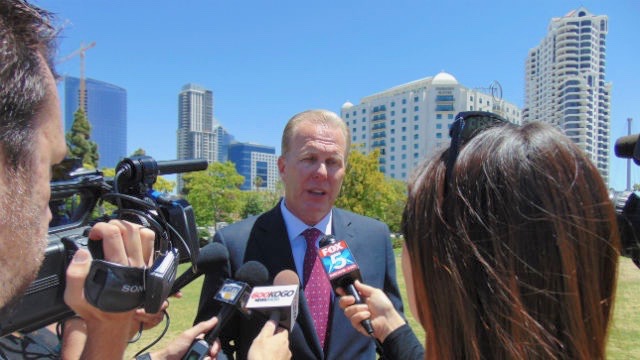Daily Business Report-July 5, 2017
Mayor Kevin Faulconer at press conference. (Photo by Chris Jennewein/Times of San Diego)
COMMENTARY
Faulconer’s ‘No’ to California Governor Race
Could Hurt GOP in Congressional Contests
By Dan Walters|CALmatters
For months, California’s Republican leaders had, with fingers crossed, hoped that the state’s top GOP officeholder, San Diego Mayor Kevin Faulconer, would change his mind. They wanted him to run for governor in 2018, contending that with Democrats drifting leftward in reaction to President Donald Trump, a centrist Republican would have a chance to win. And even if he

couldn’t win in a blue state, it was thought, if he could make it to the November ballot he would spur Republican voter turnout and help some embattled GOP congressional members keep their seats.
But Faulconer, who had consistently denied interest in running, wouldn’t change his mind and last week buried any hopes that he would. “I’m honored that so many across our state are strongly encouraging me to run for governor,” he said in a statement on Friday. “However, my first commitment is to San Diego.”
Faulconer’s opt-out makes even more likely the scenario of a Democrat vs. Democrat runoff next year, thanks to the state’s top-two primary system. With Faulconer out, as many as three weak Republicans will be running, dividing the already scant GOP voter pool and making it likely that Democrats will finish one-two in June and face each other in November.
San Diego County businessman John Cox and Travis Allen, a very conservative Republican assemblyman from Huntington Beach, have declared their candidacies, and Faulconer’s refusal means that David Hadley, a moderate former assemblyman from Manhattan Beach, will jump in as well. We’ve seen this rodeo before, just two years ago, when three little-known Republicans ran for the U.S. Senate, thus allowing two Democrats, Kamala Harris and Loretta Sanchez, to top the primary field and face off in a general election that Harris won handily.
Without a Republican on the 2016 Senate ballot and with a very unpopular Trump as the GOP presidential candidate, Democrats gained legislative seats. The stakes will be higher for Republicans next year. Democrat Hillary Clinton defeated Trump in seven of the state’s 14 Republican-held congressional districts, and several of their incumbents have been targeted as Democrats make a nationwide push to claw back control of the House.
Democratic leaders have said that their hopes of netting the 24 seats required for control are rooted in an assumption that they can win several in California by wrapping Trump and GOP votes to repeal Obamacare around the necks of vulnerable Republicans.
Not having a Republican running in November for governor, the most important office to be filled next year, will depress GOP voter turnout, and that could be critical in close congressional elections. Faulconer’s decision not to run also benefits one of the would-be Democratic governors —although which one is still uncertain — by making a second-place finish in the June primary more possible. Finally and indirectly, it also benefits Republican voters, although they may not know it. If, indeed, two Democrats are vying for the governorship in November 2016, GOP voters could be decisive in which one claims the office and, perhaps, a rung on the presidential ladder.
CALmatters is a public interest journalism venture committed to explaining how California’s state Capitol works and why it matters. For more stories by Dan Walters, go tocalmatters.org/commentary.
ABOUT THE AUTHOR
Dan Walters has been a journalist for nearly 57 years, spending all but a few of those years working for California newspapers. He began his professional career in 1960, at age 16, at the Humboldt Times in Eureka, while still attending high school, and turned down a National Merit scholarship to continue working as a journalist. At one point in his career, at age 22, he was the nation’s youngest daily newspaper editor. The Hanford Sentinel was the first of three newspaper editor positions before joining the Sacramento Union’s Capitol bureau in 1975, just as Jerry Brown began his governorship. Walters later became the Union’s Capitol bureau chief, and in 1981 began writing the state’s only daily newspaper column devoted to California political, economic and social events. In 1984, he and the column moved to The Sacramento Bee. He has written more than 9,000 columns about California and its politics and his column has appeared in many other California newspapers. Walters has written about California and its politics for a number of other publications, including The Wall Street Journal and the Christian Science Monitor. In 1986, his book, “The New California: Facing the 21st Century,” was published in its first edition. He is also the founding editor of the “California Political Almanac,” the co-author of a book on lobbying entitled “The Third House: Lobbyists, Money and Power in Sacramento,” and contributed chapters to two other books, “Remaking California” and “The New Political Geography of California. He also has been a frequent guest on national television news shows, commenting on California politics. Email: dan@calmatters.org




